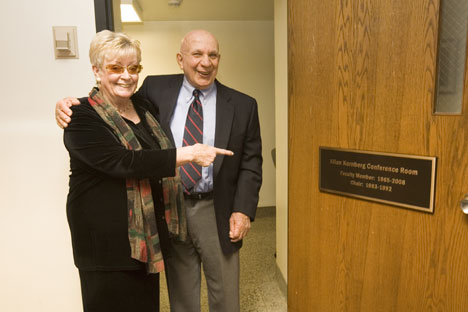
The first day Allan Kornberg moved into his Duke University office in 1965, he brought his three young children with them, who immediately took to racing down the hallways. The noise brought out longtime political science Chairman Robert Rankin who demanded to know what was going on.
Kornberg's son replied, "That's my daddy's office."
"Maybe not for long," growled Rankin.
Forty-three years later, Kornberg can tell that story with a laugh. "I guess I proved Robert wrong," he said. After teaching political science for more than four decades and chairing the department for nine years, Kornberg is approaching retirement. On Jan. 17, the department recognized him by naming classroom 317 Perkins Library after him.
"It's a honor," Kornberg said from Annapolis, Md., where he is on a retirement sabbatical completing a book project. "I'm going to miss Duke University and miss my colleagues. That's the tough part of retiring, but I'll be 77 in a couple of months, so I figure it's time."
As a scholar, Kornberg helped establish Duke as a leading center of Canadian studies and comparative political studies. Among his many publications he wrote or co-authored are Canadian Legislative Behavior: A Study of the 25th Parliament; Influence in Parliament: Canada; Citizen Politicians- Canada; and Representative Democracy in the Canadian Provinces.
He also was a leader in national professional organizations and received several honors from the American Political Science Association. From 1993-1995, he served as the first director of the Division of Social, Behavioral & Economic Research of the National Science Foundation.
And at Duke, he played several key roles in university governance. From 1988 to 1990 he served as chair of the Academic Council. He also chaired the Department of Political Science from 1983-92.
He's remaining busy, he said. He kept teaching until this year, although three years ago he started teaching half-time. He's currently working on a book with several colleagues exploring a statistical model that explains voting patterns in United States and Canadian elections.
"The thing I always loved about Duke was that it combined all of the resources of a great research university with the intimacy of a liberal arts college," he said. "I was able to keep in touch with students. I went to the Duke-Navy football game this year, and I kept hearing my named called by people I had taught. That's a wonderful thing about Duke."